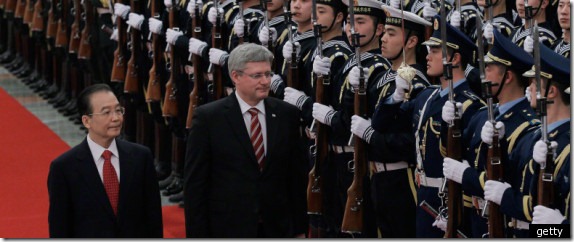1. You have neighbour two doors down who is abusing his children. Do you…?
a) Wait for his immediate neighbours to intervene and report him.
b) Arrange for an opportunity to make friends with him, perhaps borrow one another’s tools, watch one another’s pets when away, and over time, as you build a relationship with him, tell him that what he is doing to his kids is wrong and that you would like him to stop.
c) After reporting him, confront him and tell him that until he stops the abuse or releases his children into proper care there can be no normal neighbourly relationship; and that until he finds help, you will continue to work to have his kids removed.
2. There is a country across the ocean that is abusing its citizens. Do you…?
a) Wait for nearby countries to intervene and show their disapproval through sanctions.
b) Arrange for opportunities to create close economic ties, sign dozens of trade agreements that gives your country access to billions in capital in exchange for raw resources and clears a path for an unfettered free trade agreement; and in the mean time, express deep concern about their human rights record, and ask the leaders to curb their violations.
c) Work to expose the hundreds of thousands of human rights violations, imprisonments and executions, and refuse political and economic ties as they would serve to undermine any condemnations or political pressure.
In 2006, Stephen Harper said he would do c) two day ago he did b).
In 2006, Stephen Harper said, “…I don’t think Canadians want us to sell out important Canadian values – our belief in democracy, freedom, human rights. They don’t want us to sell that out to the almighty dollar.”
Yesterday in a speech, after signing 22 separate agreements worth 3 billion dollars Harper stated, “…in relations between China and Canada, you should expect us to continue to raise issues of fundamental freedoms and human rights, and to be a vocal advocate for these just as we will be an effective partner in our growing and mutually beneficial economic relationship.”
Later in the same speech, he said, “We are an emerging energy superpower. We want to sell our energy to people who want to buy our energy. It’s that simple.”
But apparently not all Tories would have gone this route: Tory MP Garry Breitkreuz noted, “Some of the most serious atrocities are happening in China at the present time and I think we have an obligation to speak up.”
Finally, Zhang Tianxiao, whose sister, Zhang Yunhe, disappeared in China in 2002 and whose brother-in-law is among the confirmed 3,400 murdered by the regime for refusing to renounce his belief in Falun Gong, cited the principle Canada is now in search of:
There is only one principle about trade, it is just that Canada should never sacrifice human rights and moral principles for any material benefit.”


Stephen Harper has spun 180 degrees from where he used to be before the recent election with regards to China and human rights. Yet if the NDP or Liberals were in charge I assume their rabid anti-Americanism would have us even deeper in the arms of the Chinese giant.
Thanks Ian, and that’s why you need to consider Green:)
Ah yes, the elusive principle! Earlier in the week, contrary to Canada’s very public defense of “Human Rights”, our Justice Minister Toevs, no less, was defending the use of torture to obtain information “in some cases”, even while acknowledging that information obtained thereby is not unreliable. So, by what logic? For what purpose do we need “unreliable testimony”?
What principle is served when we surrender in practice the very values we publicly proclaim from our global soapbox?
Is hypocrisy a principle? I’ll sign off and investigate.
OOPS! Typo in my first response. Delete “un” prefix from “unreliable”. Should read “. . . is not reliable.”
Thanks for your input Ike. I knew what you meant and where you were going. Is there not the smallest Mennonite ember somewhere in Vic Toews? So very sad.
Yes, I’d certainly consider the federal Greens if they had a different leader.
Ian, time to throw your hat in the ring.
My hope: that as we do both b. and c., that the increased exposure of millions of Chinese to the freedoms and human rights of the west will result in such internal pressure that the governmental system simply won’t be able to withstand. This, I think, is what happened to the Soviet Union and the Iron Curtain – it came tumbling down.
The neighbour needs to be reported and befriended, methinks.
Thanks Sam, I’m not sure of the ‘Russian’ comparison. That would require some study.
Attempts to befriend are right and good, but this looks much more like expediency and capitulation. That it will financially benefit both China and Canada seems apparent, but is it right?
I’m quite sure of it. We visited East Germany in 1988, during the communist regime. The people described themselves as being locked in. however, the government, aware of the benefits of tourist dollars, had made the country quite accessible. I was struck by the limitations the people endured, and wondered how a regime like this could last. I’m quite sure that one of the factors that led to the wall coming down a year later was the people’s impatience with their regime when compared with what the tourist they met had.
The befriending will have much more than financial benefits.